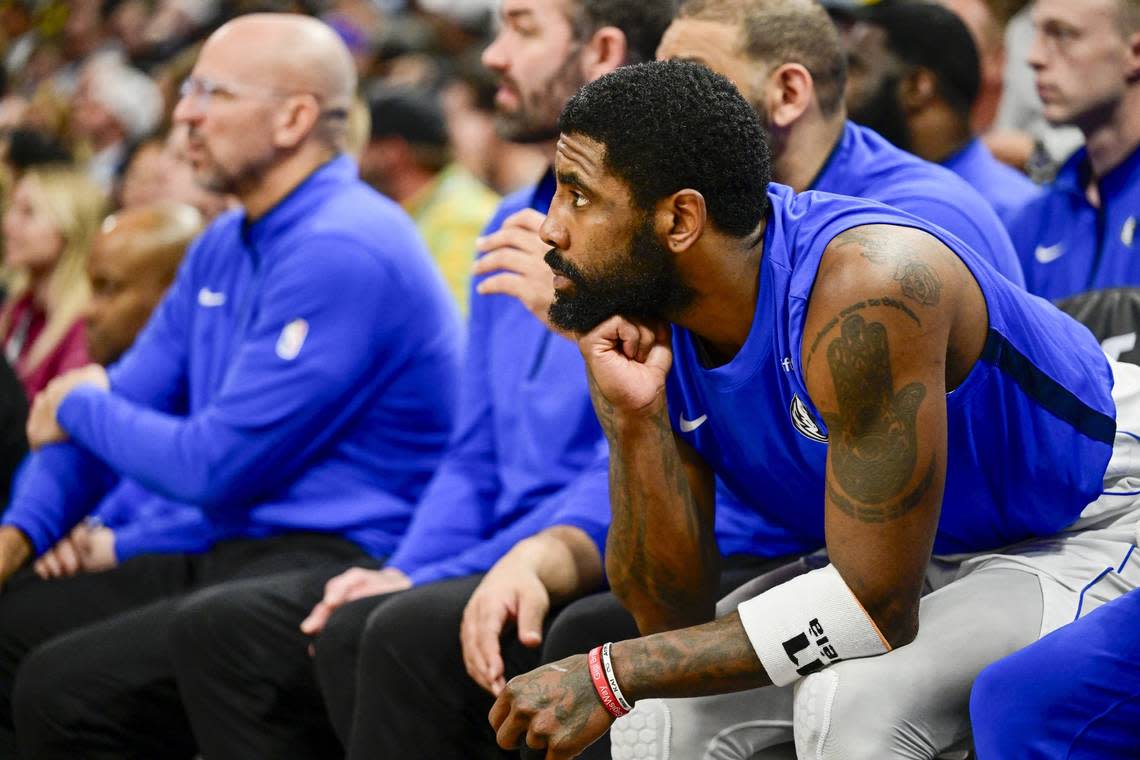One year later, it’s clear who won the Kyrie Irving trade. It’s not the Mavs or Nets.

- Oops!Something went wrong.Please try again later.
- Oops!Something went wrong.Please try again later.
- Oops!Something went wrong.Please try again later.
- Oops!Something went wrong.Please try again later.
- Oops!Something went wrong.Please try again later.
- Oops!Something went wrong.Please try again later.
One year has passed since the Dallas Mavericks acquired one of the most talented guards in basketball, and the sound you can hear echoing from the arrival of Kyrie Irving is that of a cotton ball thrown in a sound proof room.
Nothing.
Nothing bad. Nothing good.
On Feb. 6, 2023, the Mavs sent Spencer Dinwiddie, Dorian Finney-Smith, a 2027 second round pick, a 2029 first round pick, and a 2029 second round pick to the Brooklyn Nets for Kyrie, and veteran forward Markieff Morris.
At the time, the Mavericks were 29-26, and tied for fifth in the NBA’s Western Conference.
After the Mavericks defeated the Nets in Brooklyn on Feb. 6, 2024, they improved to 28-23, and are now eighth in the West.
The real winner in this deal is neither the Nets nor the Mavs. It’s Mr. Irving.
The primary detail to this trade worth celebrating is that Irving, unlike his time both with the Boston Celtics and Nets, has been no distraction.
When it comes to a trade, the standings will tell you the winner. Irving has neither helped, nor hurt, his latest team.
A lot goes into this record, but how this is all playing out is that Kyrie is quite comfortable here, and the Mavericks remain mediocre despite the presence of both he and Luka Doncic.
Kicking around coach Jason Kidd is fun, and the injury issue with this team this season is nearly a crisis, but ex-Mavs owner Mark Cuban and GM Nico Harrison have to take ownership for a roster that remains inadequate.
It was inadequate when they traded for Irving, and the same issues remain.
Since it’s been one year since he came to the team, start with Irving.
As a Maverick, he averages 26.1 points and 5.6 assists per game. By all accounts, Kyrie is well-liked, and he’s shown no signs of the personality conflicts that have partially defined his NBA career.
Considering his history in Cleveland, Boston and Brooklyn, you can never be too sure about these things but so far Kyrie the personality has not been an issue with the Mavericks.
It really helps the Mavericks signed him to a three-year deal worth $126 million last summer.
It also really helps he plays in a town that offers minimal external pressure on the team. If you’re not a Dallas Cowboy, in this town, you’re not going to hear it too much.
Even the giraffes at the Fort Worth Zoo are still not over the Cowboys’ wildcard loss to the Packers. When the Mavs missed the playoffs last spring, the reaction was that of disgust, and alarming apathy.
The real issue with Irving is that he’s 31 years old, and he can’t stay healthy.
Since coming to the team he has played in 49 of the Mavericks 78 games. Calf. Back. Foot. Heel. Thumb.
The Mavs are 25-24 in those games. He and Doncic have played together in about half of the potential games.
In this era of the NBA, where Gregg Popovich’s “load management” has morphed into a problem with no solution, and avoiding games has become as important as playing them, even Irving’s durability is a liability.
Hard to be great from the bench in a T-shirt, jeans and one of those cool trucker hats.
Take out his personality, and this issue was inevitable. Because he’s a short guard who breathlessly attacks the rim in a sea of monsters and giants.
Irving has been in the NBA since 2011, when he was a 19-year-old rookie with the Cleveland Cavaliers; he’s listed as 6-foot-2, and for men his size who play the way he does eventually has a consequence.
The same thing happened to Derrick Rose.
Unless you’re a big, or LeBron James, attacking the basket after 30 is a hard life. Even Michael Jordan, as he aged, morphed into mid-range jump shooter who became far more selective about his drives at the basket.
The fears of adding even a healthy/happy Irving to this roster were that he wasn’t a genuine solution. The Mavericks added a scorer to a team that was already decent at scoring.
These Mavericks have been beset by injuries, but this is still a sub-average defensive team. The team ranks in the bottom third of the NBA in points allowed, defensive field goal percentage, and rebounding.
That’s a great way to lose games.
This version of the NBA is entirely about scoring, but you still must stop somebody every so often.
The presence of rookie center Derrick Lively helps, but the roster is loaded with far too many small players.
The NBA’s trade deadline is 2 p.m. on Feb. 8; maybe the Mavs can find a big body that can do something in the middle. Grab a rebound. Deter a shot.
What they currently have surrounding their two best players are some nice NBA guys, and no one who makes a difference.
The team has nothing of note to offer in return, but since Cuban took over it has consistently found a way to tinker with its roster. Doesn’t always work, but they try.
Adding Kyrie Irving one year ago was not a tinker.
It was a risk that, thus far, has yielded an echo of nothing bad, or good.

